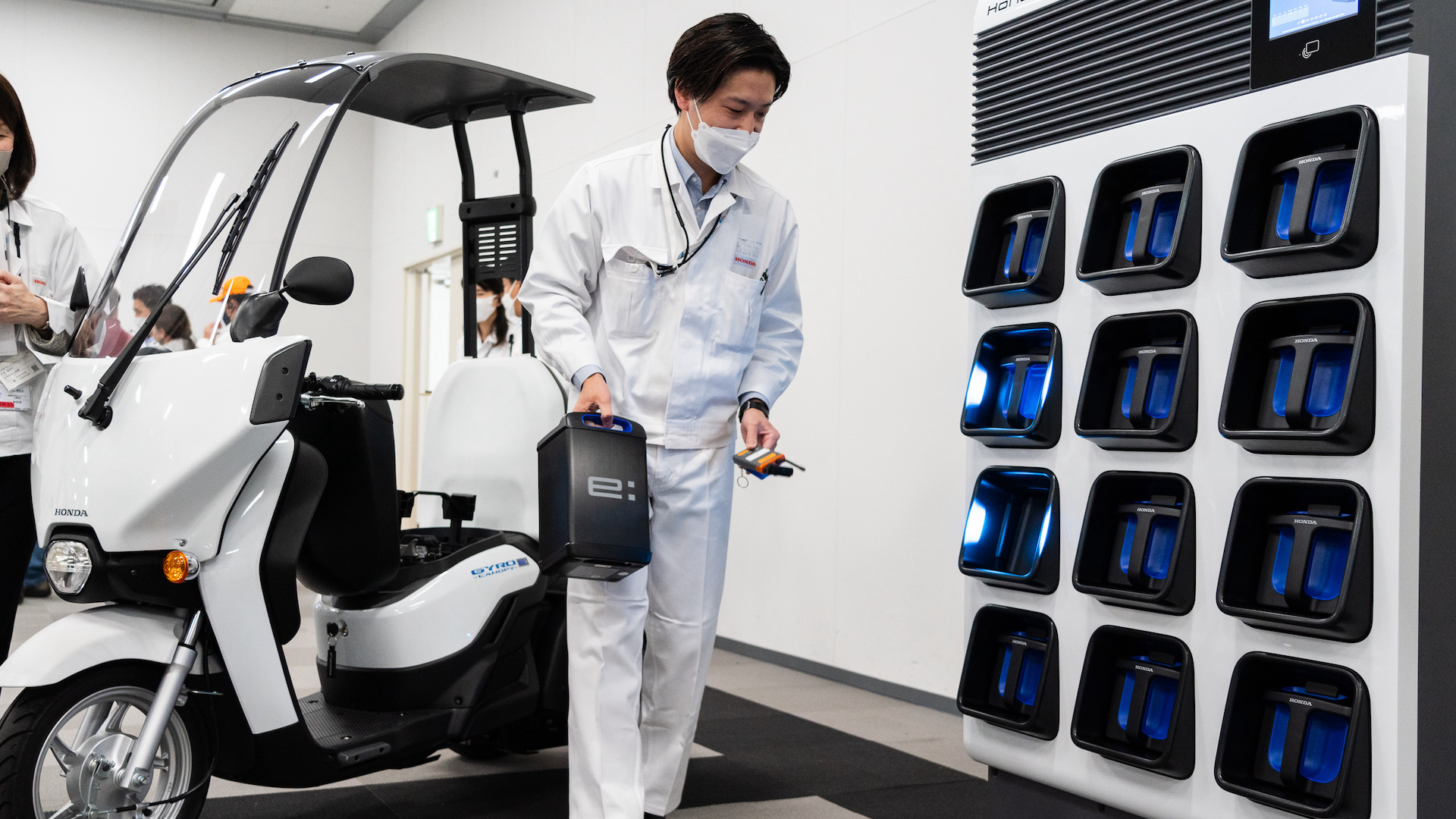

During an interview with Honda CEO Toshihiro Mibe and electrification boss Shinji Aoyama in Tokyo, the executives responsible for steering the automaker through these changing times explained to me that while building EVs is important, the ultimate goal is reaching carbon neutrality by 2050. In order to do this, electric, hydrogen fuel cell, and even hybrid eVTOL vehicles must be further developed to penetrate each corner of the transportation sector. One of the more interesting concepts we discussed, however, was creating an environment where various types of vehicles shared a common battery pack. From cars to scooters, mowers, and even houses, doing away with single-purpose batteries would be a win-win for consumers and Honda alike.
Some of this hardware already exists, and it’s dubbed the “Honda Mobile Power Pack e” and “Power Pack Exchanger e.” The mobile lithium-ion power pack is a carry-on battery similar to what we use now to charge our devices on the go or even jumpstart a car—just bigger and heavier. A Honda Mobile Power Pack e currently weighs about 20 pounds and provides up to 1.3Wh. The power pack exchanger is a sort of vending machine where the power packs can be recharged, stored, and dispensed to users. That’s the commercial solution, at least. There’s a little-known residential solution Honda is working on that takes the same concept but downsizes it to work for a home. It fits four mobile packs instead of 12, and it can also recharge the mobile units via solar power should the home be equipped for it.

The premise is simple, and I’ll use myself as an example: I have a lawnmower, a snowblower, a dirtbike, and a small sedan. (Yes, the latter two are Hondas.) While I drive my Civic every day, I don’t ride my bike nor use my blower or mower nearly as often. In fact, I hardly ever do. This concept would allow me to own one set of batteries that I can share and swap among all of my Honda machines. Why have a purpose-built battery for my mower getting depleted all winter when I could be using that same power source for my snowblower? Likewise, use the snowblower’s battery for my mower during the summer, when I could also borrow it to run my dirtbike.
When you apply this concept to a vehicle used for commuting it makes even more sense. It’d be very easy to remove the batteries of your vehicle and recharge them overnight in the pack exchanger—similar to how you’d charge an EV overnight nowadays. The biggest difference here is that if you wake up in the morning and it’s a gorgeous day out, you could skip the car ride and use the batteries for your motorcycle instead. Storming? Plop them into your car and leave the bike at home. Even better yet, should the power go out on your block, the exchanger can use the power packs’ power to feed it back into the house and provide electricity for “the average Japanese home,” I was told. Pretty convenient, even if that could only power an average American studio apartment for now.

According to a presentation I was given at Honda’s R&D facility in Tochigi, Japan, a large three-wheeled scooter could travel nearly 100 miles with two fully charged packs. No other range estimates were given for larger vehicles, though in the future these packs could also be used for ATVs, watercraft, and other rides. Engineers also demoed a Honda Power Pod e, which is essentially an electric generator. While still in the prototype stage, this would be a convenient power solution for campers or work crews who typically venture out off the grid.
Swappable batteries also open up various other opportunities; like lending a helping hand. Should you encounter a stranded motorist with a compatible vehicle, you could share a power pack with them so they can make it to their destination. Maybe a little far-fetched since you probably won’t want to give your pricey battery away, but, hey, it’s a possibility.
Lastly, there’s the manufacturing aspect of this battery/charger environment. When you have a variety of vehicles that run on the same type of battery pack, you drastically reduce the time, money, and effort that’s spent on manufacturing single-purpose batteries. It’s the same concept as having a billion devices run on AA or AAA batteries. Why spend millions and thousands of man-hours engineering a battery that only works on one type of device, when it could work on hundreds?



Honda has already rolled out one of these exchangers in Tokyo, where subscribers can scan their RFID tags to unlock battery packs for their scooters. Other companies are already taking similar approaches in Taiwan, and another startup is said to be bringing a similar solution for tuk-tuk taxis in India.
It goes without saying that this application needs to be further developed before it can be rolled out in a market like the United States. We drive longer distances, favor larger vehicles, and our overall energy consumption is radically different than most other countries. Replicating this concept with solid-state batteries could certainly push it closer to reality. So while that solution isn’t here now, I believe this concept of swappable batters makes a lot of sense.
Got a tip? Email us at tips@thedrive.com